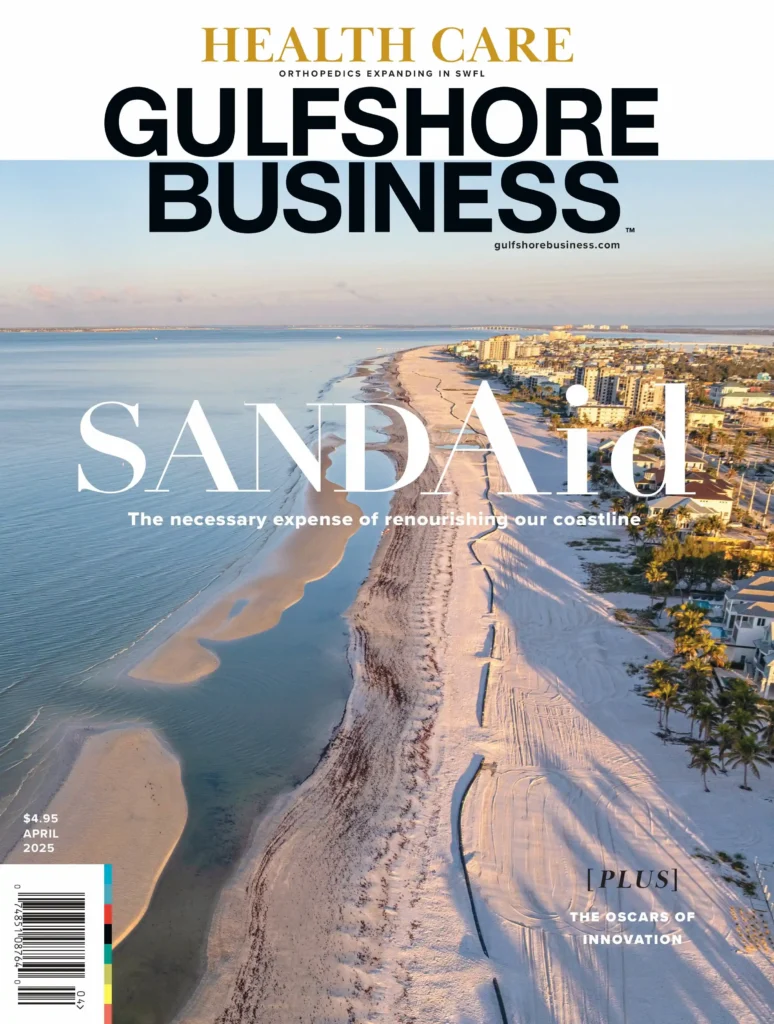The city of Marco Island is voicing opposition to the Army Corps Engineers’ approach to its Collier County Coastal Storm Risk Feasibility Study. Leaders said their concerns about the study are less of a priority for the Army Corps than those of other local municipalities involved.
Marco Island City Council member Rich Blonna has been tracking the progress of the study and said the city has been largely left out of consideration by the Army Corps. “It really seemed that Marco Island’s needs were clearly being overshadowed by the needs of Naples and unincorporated Collier County,” he said at an August meeting.
The original feasibility study began in 2018, but ultimately was terminated in October 2021 before the final draft report was released. In August 2022, the Army Corps was approved for $2.97 million in federal funding to restart its study.
Blonna said there are two vital approaches to reducing flood risk to Marco Island residents—beach berm and dune renourishment and structural measures, such as surge barriers and sea gates.
In the 2020 study’s draft impact statement, there was a recommendation not to include Tigertail and Hideaway beaches for beach replenishment. Blonna said the Army Corps’ concern was building up the beaches could lead to more development.
“Hideaway Beach has been developed for 20 years, and the Tigertail Park has been a park for 20 years. So, by eliminating that section of our beach … because you think it’s going to result in developments is crazy,” Blonna said.
 Since the Army Corps restarted the study, it has been narrowing down the strongly suggested solutions for combating flooding and deterioration of the coast due to sea-level rise and large storms. After considering comments from multiple public charettes, the Army Corps said structural infrastructure solutions, such as sea gates, are no longer being considered.
Since the Army Corps restarted the study, it has been narrowing down the strongly suggested solutions for combating flooding and deterioration of the coast due to sea-level rise and large storms. After considering comments from multiple public charettes, the Army Corps said structural infrastructure solutions, such as sea gates, are no longer being considered.
Having sea gates at the two entrances of Caxambas Park on Marco Island is something Blonna thinks could deter the majority of the island’s flood risk. Blonna, who attended a public charette in addition to the first Collier County Coastal Storm Risk Management Advisory Committee meeting in July, said the requests of Marco Island continue to be ignored.
“My complaint with the Army Corps is they don’t even want to give us an estimate or any idea of what [sea gates] would look like or how much it would cost,” Blonna said.
At the Aug. 7 Council meeting, Blonna requested a letter of dissatisfaction with the Army Corps’ direction of the study be sent to political leaders on the local, state and federal levels. The first draft of the letter was discussed Aug. 21, but Council directed staff that it was not aggressive enough in addressing their concerns.
“It’s just insulting that all this money is going to be either taken from people or created out of nothing and then taken out of the value of what they have, and a huge chunk of it’s going to coastal Collier County, and then they just disregard Marco Island,” council member Jared Grifoni said. “What is the justification? Frankly, it’s outrageous.”
The updated letter voices two main concerns with the ongoing study and makes it clear Marco Island leaders believe their requests have been dismissed from consideration.
“This letter serves to formally notify you that the city of Marco Island strongly objects to the current approach and direction of the USACE feasibility study. Specifically, we object to removing full beach berm and dune renourishment, and other possible natural measures from the feasibility study as they relate to the city of Marco Island. We ask that as this study continues, you will reexamine and include these or other potential courses of action affecting Marco Island,” states part of the updated letter.
On Sept. 5, the Council will discuss the second draft of a letter to send to legislators.





